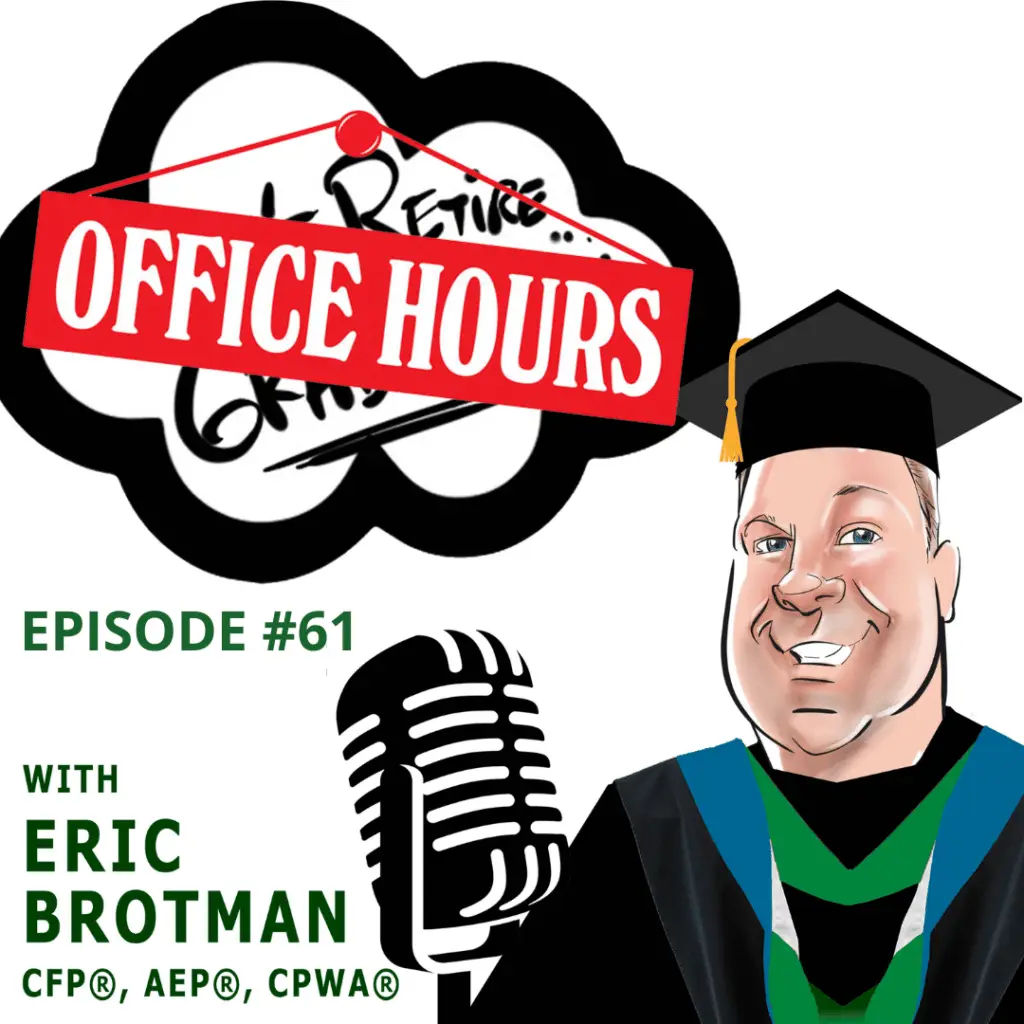In today’s Office Hours, Eric answers Julia’s question: “I’m getting divorced. How do I know if I’m getting a fair split of marital assets?”
This can be a hard situation to navigate, but bringing in a financial professional is a great way to start.
Have a question? Post it in the comments, tweet it to us at @BrotmanPlanning, or post it on our Facebook and it may be used in a future episode of Office Hours!
[00:00:00] Eric Brotman: Welcome to “Don’t Retire, Graduate”, the podcast that asks you what you want to be when you grow up, so you can graduate into retirement with purpose and passion. I’m your host and valedictorian Eric Brotman, and this is Office Hours, where we answer questions from listeners like you about personal finance, retirement readiness, and more.
We received a question from Julia who asked, “I’m getting divorced. How do I know if I’m getting a fair split of marital assets?” and Julia, the, the short answer is generally you don’t. Because as much as you want to, to consider something to be fair and equitable it, it often has it, it’s often a very difficult thing to do and to determine fairness. What I would encourage you to do is if you are using a mediator, when you get divorced the mediator should bring in a financial expert, whether it’s a certified divorce planner or a, a certified financial planner practitioner or someone to come in, who’s objective- who can come in and look at this and try to divide things in an equitable way. If you are in a more contentious divorce where each side has your own attorney and you have one and your estranged spouse has one you’re gonna want your own attorney to bring in a financial expert to make sure that you are not being taken advantage of by the other side. And of course that becomes more work and like anything else, it becomes more expensive if you’re, if you’re battling. So in an ideal world divorce can be something that that is done by mediation that is done in a hopefully amicable way where fairness can be achieved. I do, Julia, wanna point out though that “equitable” and “equal” are not the same. And that every dollar is a little bit different based upon the characteristics. So if you were to look at a, at a balance sheet and say, well, I have 50% of the assets and my former spouse- to- be has 50% of the assets- that doesn’t tell the whole story, because some assets, for example retirement plans, IRAs and others, are still gonna be subject to income tax when it’s used. Whereas other assets like a Roth IRA might not be taxable at all. At the same time, a non-qualified account, whether it’s joint or in one of your names or the other, if it’s not a retirement plan, it gets capital gains treatment instead of ordinary income tax, and therefore you can defer some of those gains until you realize them. And I, I know I’ve gotten into CPA speak and I apologize for the jargon. But at the end of the day, know that if the number at the bottom of both columns is equal, that may still not be fair and equitable. And so you want a financial advisor or someone who’s an expert on this to weigh in whether it’s with your mediator or whether it’s with your attorney to make sure that really, this is fair. Because what’s gonna happen is you and your former husband or, or spouse will be in a situation where you’re, you have different levels of income and therefore you have different tax tax liabilities on the same dollar. And so “equitable distribution” might have two different numbers at the, at the bottom of each column. So I hope that’s helped. I, I don’t think there’s a, a simple answer to this other than other than having an advisor take a look at this and your attorney will know these folks. If you have a financial advisor, that’s great. If you and your spouse share an advisor and you’re meeting with a mediator, your advisor might be able to help. But if this is going to two different attorneys, you’re gonna have two different financial people who are gonna look at this under a different lens. And so I, I do think you should make sure you have your own representation and I suspect your attorney would tell you the same. So Julia, I hope that helped. It’s it’s a difficult thing. Divorce is expensive and and taxing in both financial and non-financial ways and I wish you luck, and I thank you for your question.
If you’d like to send us a question, which we might answer in a future episode of Office Hours, please post it on our Facebook page or tweet us @ Brotmanplanning. I’d like to thank all of you for listening and some of you for watching for the very first time. We’d love to hear from you so please send us a message, leave us comments, leave us reviews. And if you enjoyed the show, please, please share it with friends. We’d love a broader audience. So for now, this is Eric Brotman reminding you: don’t retire, graduate!
[00:04:25] Narrator: Securities offered through Kestra Investment Services, LLC. Kestra IS, member FINRA SIPC. Investment advisory services offered through Kestra Advisory Services, LLC. Kestra AS, an affiliate of Kestra IS. Kestra IS or Kestra AS are not affiliated with Brotman Financial or any other entity discussed.



